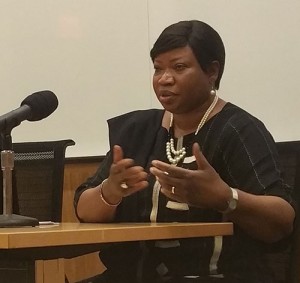African Union allegations of bias and targeting against the International Criminal Court for investigating war crimes on the continent, while ignoring atrocities elsewhere, are nothing more than obstructionist “propaganda,” ICC Prosecutor Fatou Bensouda said during a talk sponsored by the Law School’s Leitner Center for International Law and Justice on November 5.
The ICC’s eight ongoing investigations into war crimes in places like the Ivory Coast, Libya, and the Sudan arose from those state-parties requesting ICC investigations, Bensouda told the audience, calling the African Union’s decision not to support the ICC “unfortunate.”
“What we are doing is for the benefit of the people of the continent because the people of the continent matter,” the Gambia-born prosecutor said, of African war crimes investigations.

Founded under the Rome Statute in 2002, the ICC is a court of last resort based in The Hague that holds jurisdictional power to investigate allegations of war crimes, genocide, and crimes against humanity in 123 nation-states, as well as the power to investigate crimes of citizens from these nation-states when they take place outside ICC jurisdiction (e.g., Syria).
The court’s chief criticism has traditionally centered around its focus on Africa, Leitner Family Professor Martin Flaherty noted in his introduction, but such criticisms have been “muted with Bensouda as prosecutor.”
In addition to eight ongoing investigations into African nations, the ICC has eight preliminary examinations into non-African nations. The ICC’s preliminary examination into Georgia could soon become the court’s first in a non-African nation to move beyond the fact-finding and analysis stage, moderator Jennifer Trahan, NYU Professor, said.
The ICC also has preliminary examinations into U.S. conduct in Afghanistan and U.K. conduct in Iraq. The ICC’s relationship with the United States is strong at the moment, Bensouda said, expressing hope it would continue. She did not offer any hints as to whether either the ICC’s examination into the U.K. or United States could one day lead to an investigation.
In all cases the ICC investigates, the course of action is dictated by the facts and the law, not political considerations or the likelihood of an arrest being carried out, Bensouda said. The ICC does not have arresting power, a problem in countries like the Congo and Sudan. Other challenges include cooperation; Bensouda offered South Africa’s reluctance to extradite Sudanese president and convicted war criminal Omar al-Bashir as an example.
Politicization, witness interference, fear, the volatility of post-war zones, and insufficient resources to investigate every legitimate case are among the other hurdles the ICC faces. Still, Bensouda remains determined in spite of all the obstacles.
“My office will always move to do what it’s supposed to do, anywhere,” the prosecutor said. “And it will do so without fear or favor.”
In Mali, for instance, the prosecutor’s determination resulted in the ICC’s first-ever war crimes prosecution for cultural destruction against Ahmad al-Faqi al-Mahdi, an Islamist leader who took over Timbuktu in 2012 and destroyed ancient artifacts before being ousted one year later.
The ICC also issues policy papers on various important global topics, most recently on sex- and gender-based crimes. The organization hopes to release a policy paper on children in 2016, spurred in part by the ICC’s investigation and subsequent conviction of Congolese child army leader Thomas Lubanga for war crimes.
“Children don’t belong on battlefields,” Bensouda said. “They belong in classrooms. They belong on playing fields.”
–Ray Legendre

